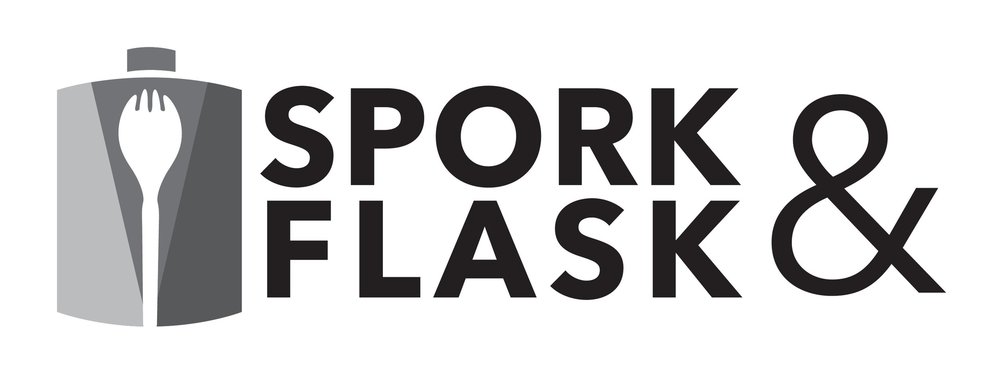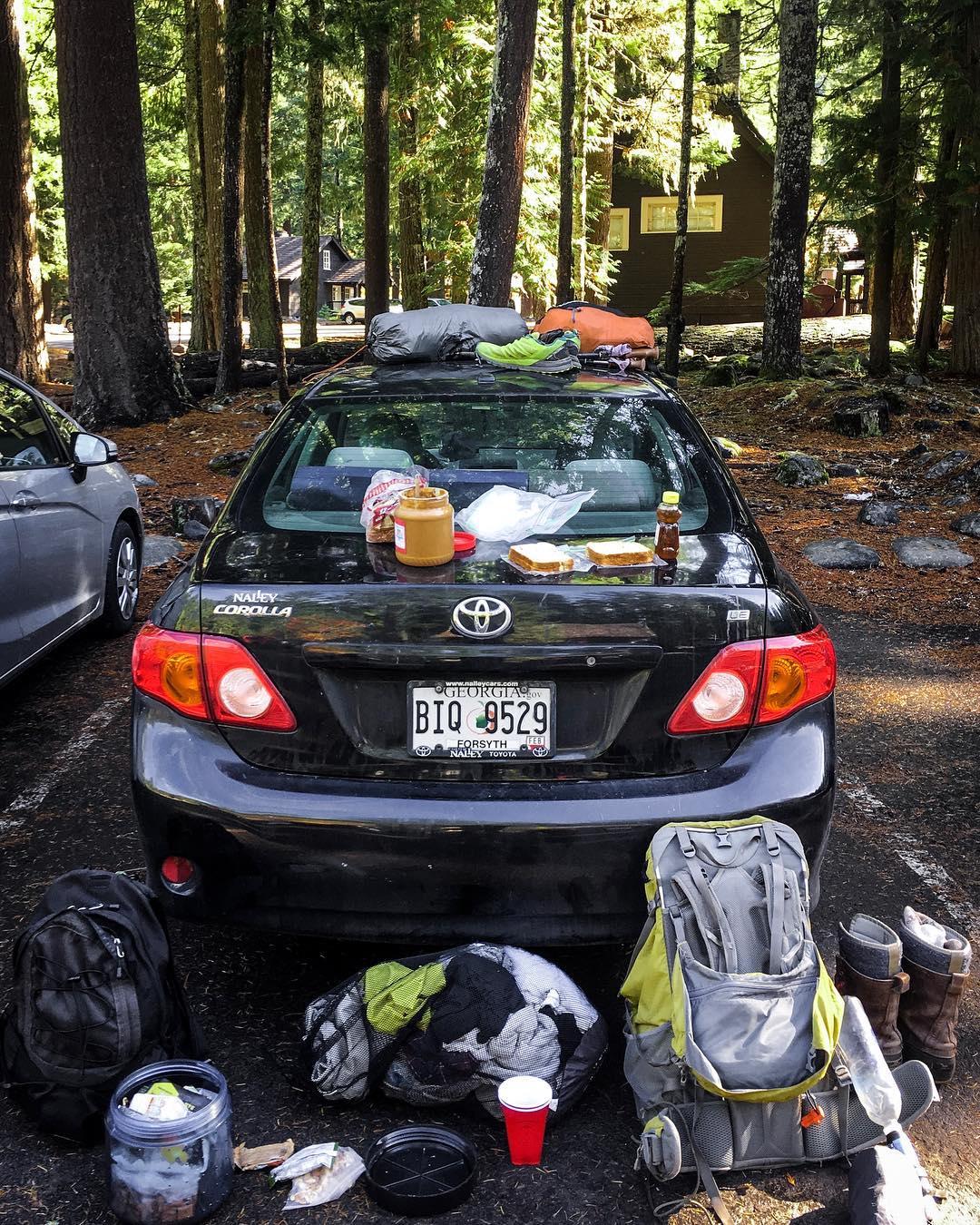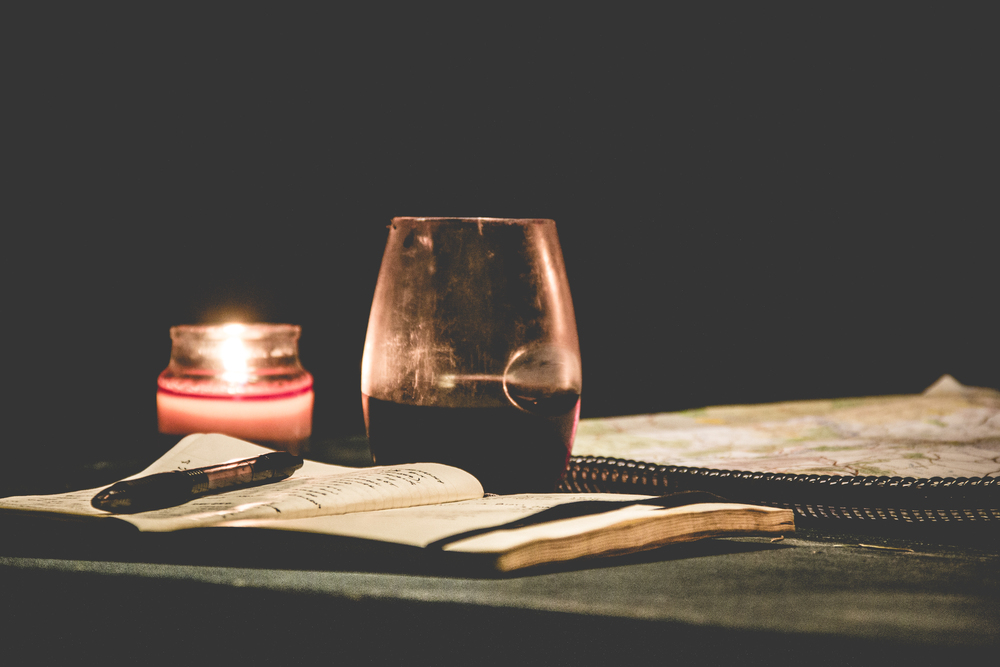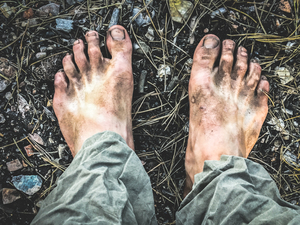I've been blessed with the opportunity to spend over six total months on the road in the past three years. I've gotten pretty damn efficient at packing, so I figured I'd share my list with you.
1. This was an excessive amount of stuff because I was moving. 2. Yes, I somehow fit all of this in the Corolla.
Group 1: Camping Gear
For a complete backpacking packing list, see How the Hell Do I Pack for 6 Months in the Woods?
- Packs – I never know exactly what I'm going to get into, so I want to be prepared for all options. I usually bring three packs - an 18 liter for dayhikes, a 45 liter for overnighters, and a 62 liter in case I take off on a multi-day backpacking trip. They're all REI Flash Packs.
- Tents – I bring two tents: a Tarptent Contrail which is prime for ultralight backpacking, and a Big Agnes Copper Spur UL3 for car camping.
- Tarps – I bring two or three to hang in camp if it’s going to rain.
- Hammock and Straps - Always good for hanging out. Make sure to check local regulations, though, as some places will fine you for attaching straps to trees.
- Sleeping Bag – I always bring a zero degree bag, no matter where I'm headed. I additionally bring a an ultralight bag - the Big Agnes Mystic UL 15 - for backpacking trips.
- Blanket - A heavy wool blanket is good backup in case it gets super cold. Also, its great to have for chillin' by the campfire. I also have a space blanket in my first aid kit, just in case.
- Sleeping Pads – I bring my Thermarest Neoair along with a closed cell foam pad for backup (I’ve had serious issues with sleeping pads in the past).
- Lightweight Pillow - I usually just use a jacket, but you may want something more substantial.
- Fold Up Picnic Table – Sounds ridiculous, but it’s a great addition.
- Hard Top Table - Really nice to have a table in camp.
- Camp Chair – Great to have while car camping. Might want to bring two in case you meet a friend.
- Water – I bring two seven-gallon jugs of water, and make sure at least one of them is always full. I additionally bring a three-liter water bladder for hiking, and a Nalgene for general purposes.
- Purification - Sawyer Filter. In my opinion, they're the best purification system on the market. I bring a SmartWater bottle to attach it to.
- Cookset – 16 oz. pot, ultralight frying pan, and a canister stove with fuel. I typically go simple on the road, eating mainly mac n' cheese or powdered potatoes.
- Mug - Because camp coffee is the best.
- French Press - Yeah I'm fancy.
- Spork - and...
- Flask!
- Headlamp - I usually bring two. Also, bring backup batteries.
- First Aid Kit - I have a big first aid kit with all sorts of good stuff - and I'm glad I do, because it has been used multiple times. My pre-assembled kit has everything from gauze and band-aids to burn kits and eye care products. I additionally have a smaller kit for hiking - see the backpacking gear post for full breakdown.
- Knives - I have a big Esee 6 for processing firewood, a mini Victrinox for backpacking, and a Victrinox multi tool for... well, mainly for opening wine bottles.
- Axe – Always useful.
- Machete - Not really necessary, but it's fun. Thanks, Gray.
- Lighters/Fire Starters - For various purposes. I usually use old trail maps and park newspapers as kindling if there's nothing around.
- Paracord – Extremely helpful for a ton of purposes.
- Trekking Poles - I hardly ever hike without 'em.
- Fishing Pole and Tackle box – I’m a shitty fisherman, but it’s meditative.
- Camp Towel - Good to have for bathing in lakes.
- Solar Powered Lights – It’s all about the ambiance.
- Candles – If you can’t have a fire, a candle is a nice touch.
- Bear Spray - If you're going to grizzly territory, get some and know how to use it.
- Bear Canister - Good to bring if you have one.
- Backups/Extra – Because I didn’t know what might go wrong, I brought some extra items: Fuel, duct tape, hand warmers, medicines.
Group 2: Electronics & Leisure
- Camera/Accessories – I have a Canon 60D with a telephoto and a wide angle lens and cases for each. Accessories include three backup batteries, two chargers (one for the car), many memory cards, two tripods (one ultralight, one… not), a remote control, lens filters.
- GoPro/Accessories – Great to have.
- GPS – Helpful for keeping track of miles and not getting lost. I need to get some sort of SPOT device/ satellite phone, but haven't made the dive yet.
- Voice Recorder – I only used this on my initial roadtrip, but it turned out to be one of the best decisions of the trip. I knew I wanted to keep an extensive journal, and because I was in the car so much, I had hours on end to document the events without having to write. It felt goofy at first, but I loosened up within the first couple days and I have some great notes from it. I don’t really use it on trips anymore as I’ve since realized my appreciation for writing.
- Computer/Accessories – Depending on the extent of my trip, I may or may not bring it. It definitely is nice to be able to switch out music and backup your photos, though.
- Iphone chargers – Two backups, because those things tend to disappear.
- Solar Chargers - Great to have to keep everything charged up.
- Portable Power Bank - Also great to have in case the sun's not beaming.
- Jams – Make sure you have a way to play music in the car. I have an FM transmitter.
- Portable Speakers - Good to have one or two for playing jams in camp. Make sure to bring chargers.
- Headphones - Probably should bring a back up pair.
- Journal – I write pretty much every day I'm on the road now. Bring a bunch of back up pens too.
- Postcards/stamps – I occasionally write some friends while sitting around camp. Nice to stay in touch while so far away.
- Harmonica – Fun to have while sitting around the campfire. I don't play songs, I make noises.
- Books – Bring an assortment, as you don't know what you'll be feeling on the trip. I usually bring The Alchemist, some poetry, Nat Geo's Guide to the National Parks, and a few others.
Group 3: Clothes
- Hiking Stuff – See my clothing section for a typical hiking trip here.
- Rain Jackets – Two: one lighter one for hiking, one for torrential storms.
- Regular Jackets - One ultralight down jacket for hiking, one synthetic puffy jacket, one fleece jacket. Its good to have layers and options.
- Shirts – Three long sleeve button ups (one flannel, one nicer for towns, one for hiking), two long-sleeve synthetic shirts, one short sleeve button up (party shirt), three t-shirts (one for hiking).
- Pants - One pair of jeans, one pair of Kuhl rugged pants, one pair of Arc'yteryx hiking pants, two pairs of long johns, one pair of snow pants. Also, rain pants are good.
- Shorts – One pair of khaki shorts, one pair of running shorts, one bathing suit.
- Undies – A bunch of pairs. Sometimes I go weeks without doing laundry.
- Socks – Two pairs of running socks, three pairs of hiking socks (one thicky thick for the cold nights).
- Hats – One wool beanie, one lightweight synthetic beanie for hiking, one wide brim hat for hiking, one ball cap, and one wide-brim adventure hat.
- Shoes – Chacos, trail runners, hiking boots, and a pair of kicks or dress boots for towns.
- Gloves – Two pairs: one lighter pair, one waterproof.
- Bandanna - Great for multitude of purposes.
- Watches - One for hiking, one for town swagger.
- Sunglasses - Bring an extra pair or two.
Group 4: Misc.
- Food – I usually make a big run to the grocery store before taking off to pick up all sorts of non-perishables. Mainly hiking food, trail mix, snickers, clifbars, nuts, peanut butter, coffee.
- Cooler – Great to have to store beers. And other perishables too.
- Box of Wine – Obviously.
- Whiskey - Duh.
- Solo Cups - Good for wine or whiskey.
- Coozies - Bring multiple.
- Atlas – Obviously great to have.
- Yoga Mat – Riding in the car for a billion hours can leave you all out of whack. Yoga helps.
- Foam Roller - See above.
- Lumbar Pillow – The Corolla has terrible lumbar support and destroys my back. A lumbar pillow has been extremely helpful.
- Ice Scraper - Never know when you'll see snow.
- Toiletries - Toothbrush/paste, eye glasses, contacts (bring many extra pairs), sunscreen, vitamins, and whatever else you need.
- Toilet Paper - Also, hand sanitizer.
- Soap - Occasionally good to have, especially if you don't want to shower using handsoap from campground bathrooms.
- Paper Towels - Because you'll inevitably spill something.
General Notes
- FreeCampsites.net - this is the best. I've found some of my favorite campsites ever via this site. My usual day involves waking up, looking at a map to figure out which direction I'm headed next, then checking Free Campsites to see what I can find. Sidenote: you probably won't have much service throughout the trip. Take advantage of it when you can - get breakfast at diners and plan your day as you wait - the variable staff and meals make for great stories.
- Invest in a National Parks Pass - They're only $80 and quickly pay for themselves.
- You'll regularly need to replenish water, firewood, and ice.
- Before you leave, make sure to download any music and podcasts you want since you'll be lacking service.
- Before you leave, get an oil change and make sure your car is running well.
Finally, just some general advice - make this your trip. Roadtrips are all about spontaneity and following where the road leads you. I rarely have a true gameplan on any of my trips, and it is this that allows not only an unparalleled feeling of freedom, but also a certain amount of magic. When you allow yourself to open up to the road, you invite the universe lead you to insanely serendipitous and synchronous moments that can seem absolutely unreal. Truly wild moments. If you see a sign for something that sounds cool, take that road. If you see a restaurant that looks intriguing, stop in for a beer. If you meet someone who seems interesting, listen to their words. If you feel like taking an extra day in one spot, do it. Slow down, listen to what the road is saying to you, and find meaning in the miles.
- CJB












